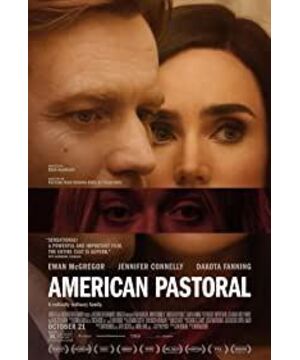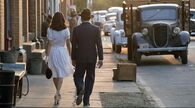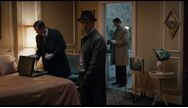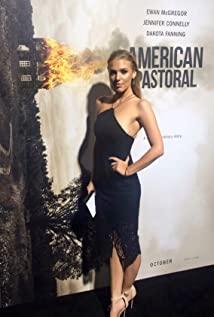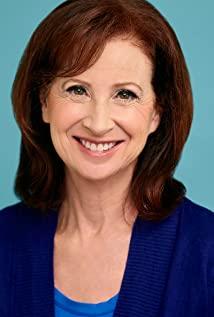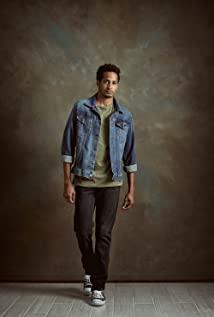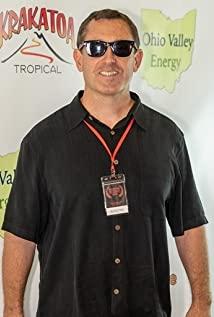The novel alludes alludes extensively to the social upheavals of the late 1960s and early 1970s. It refers to the 1967 Newark riots , the Watergate scandal , the sexual revolution and Deep Throat , the code name of the secret source in the Watergate scandal and the title of a 1972 pornographic film . In the novel's final scene, both the Watergate scandal and the pornographic film are discussed at a dinner party during which the first marriage of "the Swede" begins to unravel when he discovers that his wife is having an affair. The novel also alludes to the rhetoric of revolutionary violence of the radical fringe of the New Left and the Black Panthers , the trial of the leftist African-American activist Angela Davis , and the bombings carried out between 1969 and 1973 by the Weathermen and other radicals opposing the US military intervention in Vietnam. The novel quotes from Frantz Fanon 's A Dying Colonialism , which Zuckerman imagines as one of the texts that inspires Merry to carry out her bombing of a local post office.
In the novel, Merry's bombing takes place in February 1968, during the presidency of Lyndon B. Johnson , after which she flees her parental home. By that time she has had a "Weathermen motto" tacked up in her room for many months. In reality this would have been impossible. The Weathermen group was, in fact, formed in the summer of 1969. The lines of the "motto" which appear in the novel ("We are against everything that is good and decent in honky America. We will loot and burn and destroy. We are the incubation of your mothers' nightmares.") allude to a speech by John Jacobs at a Weathermen " war council " in December 1969.
The inspiration for the Levov character was a real person: Seymour "Swede" Masin , a legendary all-around Jewish athlete who, like the Levov character, attended Newark's Weequahic High School . Like the book's protagonist, Swede Masin was revered and idolized by many local middle-class Jews. Both "Swedes" were tall and had distinctively blond hair and blue eyes, which stood out among the typically dark-haired, dark-complexioned local residents. Both attended a teachers' college in nearby East Orange; both married out of their faith; both served in the military and, upon their return, both moved to the suburbs of Newark.
American Pastoral was a scrupulously researched book; Roth traveled to Gloversville , New York to learn about the glove-making industry and interviewed Yolande Fox , the winner of the 1951 Miss America pageant, while developing the character of Dawn Dwyer. [3] Roth later said, of his conversations with Fox, "She was very smart, very funny.... She just opened up whole ideas for me that I couldn't have had on my own."[ 4]
----------------
The 1967 Newark riots was one of 159 race riots that swept cities in the United States during the " Long Hot Summer of 1967 ". This riot occurred in Newark, New Jersey , between July 12 and July 17, 1967. Over the four days of rioting, looting, and property destruction, 26 people died and hundreds(727) were injured .
The long, hot summer of 1967 refers to the 159 race riots that erupted across the United States in the summer of 1967. [2] [3] [4] In June there were riots in Atlanta , Boston , Cincinnati , Buffalo , and Tampa . In July there were riots in Newark , Detroit , Birmingham, Chicago, New York City , Milwaukee , Minneapolis , New Britain, Rochester, Plainfield , and Toledo.
Date Summer of 1967
Location United States
Resulted in Kerner Commission established
Casualties----
Death(s)85+ [1]
Injuries 2,100+
Arrested11,000+
--------
The Weather Underground Organization (WUO), or Weather Underground for short , commonly known as the Weathermen, is a far - left organization in the United States . The Vietnam War organized students to splinter out of the radical faction of a democratic society , with the goal of overthrowing the U.S. government with a secret violent revolution . The group carried out a series of bomb attacks against the U.S. government in the 1970s, but mainly for the purpose of destroying property, with clear warnings before each attack to avoid casualties. The organization has also planned riots and prison robberies.
history [ edit ]
The Weatherman originated from a faction called the Revolutionary Youth Movement in the Students for Democracy . It was established in 1969 with the purpose of creating a secret revolutionary party to violently overthrow the US government and establish a dictatorship of the proletariat to achieve communism . Its name comes from a line from Bob Dylan 's song " Subterranean Homesick Blues ": "You don't need a weatherman to know which way the wind is blowing." way the wind blows.) They called for the formation of a "white fighting force" and a "black liberation movement" to join forces with other radical movements to achieve the goal of destroying American imperialism and ultimately building a classless communist world. [2]
The Weatherman is a product of the ultra- radical New Left under the American counterculture movement of the 1960s , with characteristics of the Black Power and New Communist movements in the United States at that time. The organization opposes racial discrimination and the Vietnam War , and believes that only by bringing the war to the United States can the American people understand the crimes committed by their government abroad. In the documentary Weather Underground, the then-member stated: "In an age of violence, watch your country slaughter innocent people on other people's lands, and if you do nothing, just keep enjoying yours The comfort of the middle class is an act of violence in itself.” [3]
From 1969 to the mid-1970s, the Underground Weatherman was known for carrying out numerous bombings , riots and prison robberies . They had their first public demonstration , the Day of Vengeance , in Chicago on October 8, 1969 , which eventually turned into a riot. In the 1970s, underground weathermen "declared war" on the U.S. government and began bombings, mostly targeting government buildings and some banks. They usually give advance warnings to evacuate and issue reasons for protests before the explosion. For example , the attack on the U.S. Capitol on March 1, 1971 was a protest against the U.S. invasion of Laos , the attack on the Pentagon on May 19, 1972 was "in retaliation for the U.S. bombing of Hanoi ", and the attack on the U.S. State Department on January 29, 1975 was a protest "in The war in Vietnam expanded” and so on.
Weather Underground began to decline after the U.S. withdrew from Vietnam in 1973. Some members joined other organizations, and some continued their criminal activities and were arrested. The group disbanded in 1977.
-------
The 1960s counterculture movement was a type of countercultural counter - establishment that first occurred in the UK and the US , and then spread on a large scale in the Western world from the early 1960s to the mid- 1970s . London , New York and San Francisco were hotbeds of early countercultural activity. As the civil rights movement in the United States evolved, the counterculture movement gained further growth and evolved into a revolutionary movement as the US government expanded its military intervention in Vietnam . [3] [4] [5] Since the 1960s, there has also been widespread tension in the United States on social issues such as human sexuality , women’s rights , experimentation with psychotropic substances , attitudes toward traditional authority, and Interpretation of the American Dream . Movements related to these controversial issues were born and developed in the counterculture of the 1960s.
With the development of this movement, many new cultural forms and subcultures were born one after another, and alternative cultures and lifestyles such as bohemianism and hippies came into being. This phenomenon was especially evident during the British invasion , when the Beatles and some other filmmakers had their work restricted by censorship . In addition to the trend-setting Beatles, many other creative artists, writers, and thinkers, within many industries and professions, have helped define the counterculture.
Several factors distinguish the countercultural movement of the 1960s from previous anti-authoritarian movements. The post- World War II " baby boom " [6] [7] produced an unprecedented number of potentially socially disaffected young people who, as potential participants in American society, rethought the development of American democracy. direction. The abundance of domestic wealth in the postwar United States also made them less concerned with their own and their family's finances, the material necessities that their parents, who lived primarily during the Great Depression , had to worry about. [8] It is worth noting in this era that a large part of the series of acts in this movement and their causes were quickly absorbed by mainstream society, especially in the United States. [9] [10] [11]
The counterculture movement essentially began with the assassination of President Kennedy in November 1963 , it merged into popular culture with the end of U.S. military involvement in Southeast Asia and the 1973 Conscription Act, culminating in Nixon's resignation as President of the United States in August 1974 .
Broadly speaking, the countercultural movement of the 1960s acted in many ways as a social catalyst that brought about rapid change in that era.
View more about American Pastoral reviews


